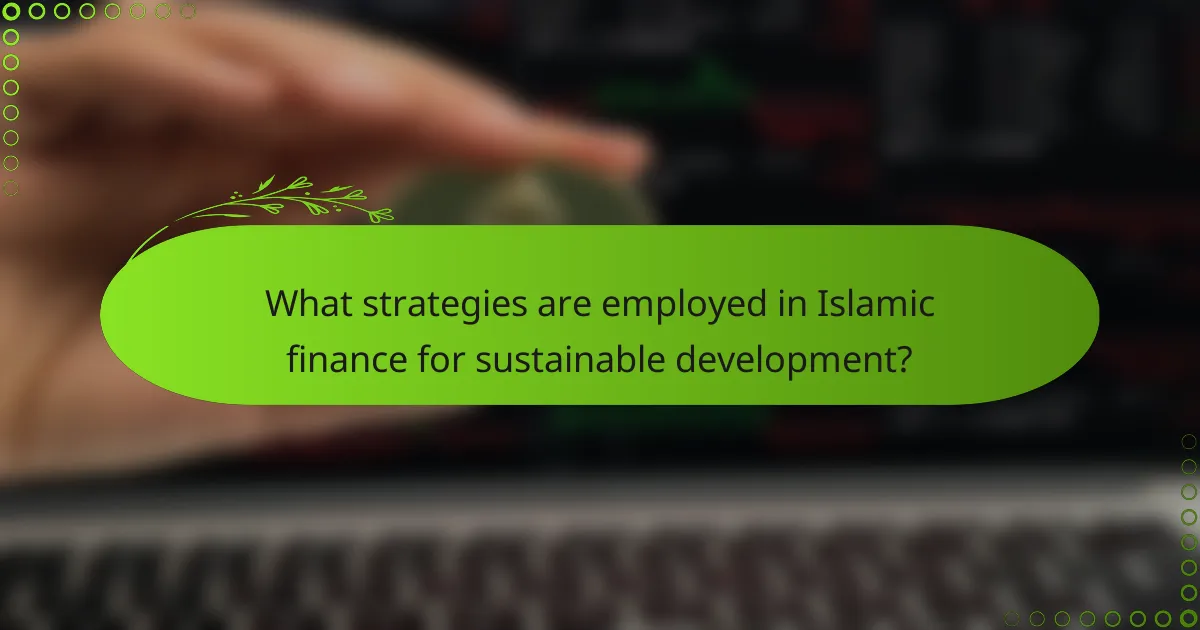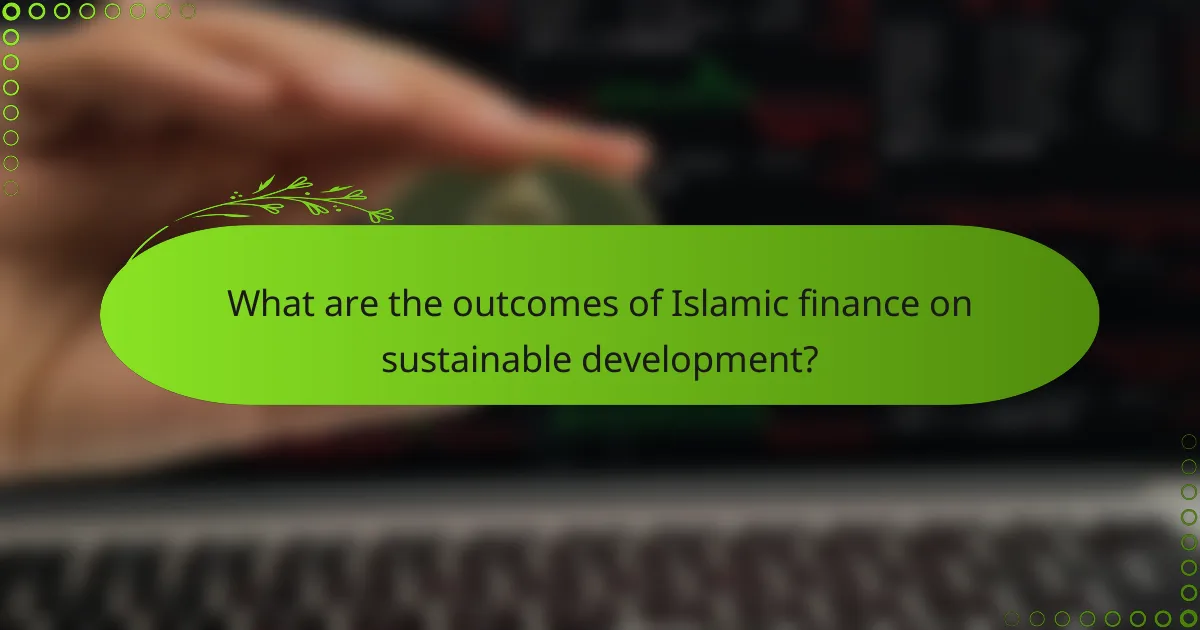
What is Islamic Finance and Sustainable Development?
Islamic finance is a financial system that adheres to Islamic law (Sharia). It prohibits interest (riba) and promotes ethical investments. Sustainable development refers to meeting present needs without compromising future generations. It emphasizes economic growth, social inclusion, and environmental protection. Islamic finance aligns with sustainable development through its focus on ethical investments and social welfare. It encourages investments in sectors that promote sustainability, such as renewable energy and social enterprises. Studies show that Islamic finance can contribute to sustainable development goals by providing financing for projects that support economic and social growth.
How do Islamic finance principles align with sustainable development goals?
Islamic finance principles align with sustainable development goals by promoting ethical investments and social justice. These principles are rooted in Sharia law, which emphasizes fairness, transparency, and risk-sharing. Islamic finance prohibits investments in harmful industries, thereby supporting environmental sustainability.
Additionally, it encourages financial inclusion by providing access to capital for underserved populations. This aligns with the goal of reducing poverty and inequality. Furthermore, Islamic finance promotes responsible consumption and production patterns, which is essential for sustainable development.
Research shows that Islamic finance can mobilize substantial funds for sustainable projects. For example, the Global Islamic Finance Report highlights the potential of Sukuk (Islamic bonds) for financing infrastructure and renewable energy initiatives.
What are the key principles of Islamic finance?
The key principles of Islamic finance are prohibition of riba (interest), risk-sharing, and ethical investments. Riba is forbidden as it creates unjust enrichment. Risk-sharing promotes fairness in financial transactions. Ethical investments ensure that funds are not used in activities contrary to Islamic law. These principles are rooted in Shariah law, which guides financial practices. The application of these principles fosters economic stability and social justice. Islamic finance aims to promote equity and inclusivity in financial dealings.
How does Islamic finance promote ethical investments?
Islamic finance promotes ethical investments by adhering to Shariah principles that prohibit unethical practices. These principles include the avoidance of interest (riba), excessive uncertainty (gharar), and investments in harmful industries such as alcohol and gambling. By focusing on socially responsible ventures, Islamic finance encourages investments that contribute positively to society.
Moreover, Islamic finance emphasizes risk-sharing and ethical partnerships. This approach aligns the interests of investors and entrepreneurs, fostering transparency and accountability. The principles of profit and loss sharing ensure that all parties involved are treated fairly and equitably.
Evidence of this ethical framework can be seen in the growth of Islamic finance, which has reached over $2 trillion in assets globally. This growth reflects a rising demand for investment options that align with moral and ethical values.
What role does Islamic finance play in fostering economic growth?
Islamic finance plays a significant role in fostering economic growth by promoting ethical investment and financial inclusion. It adheres to principles that prohibit interest, thereby encouraging risk-sharing and equitable profit distribution. This system supports small and medium enterprises (SMEs) through accessible financing options. According to the Islamic Financial Services Board, the global Islamic finance market reached approximately $2.88 trillion in 2021, indicating its substantial impact on economic development. Furthermore, Islamic finance promotes social welfare by investing in sustainable projects that align with Shariah principles. This approach helps stimulate job creation and enhances community well-being.
How can Islamic finance contribute to poverty alleviation?
Islamic finance can contribute to poverty alleviation by promoting equitable wealth distribution and ethical investment. It prohibits interest, which can lead to financial exclusion for the poor. Instead, it encourages profit-sharing and risk-sharing arrangements. These methods empower individuals to start businesses and create jobs. Microfinance initiatives in Islamic finance provide small loans to entrepreneurs. This helps them generate income and improve their living standards. Studies show that Islamic microfinance has successfully lifted many out of poverty. For instance, the Islamic Development Bank supports various projects focused on poverty reduction.
What are the impacts of Islamic finance on job creation?
Islamic finance positively impacts job creation by promoting ethical investment and entrepreneurship. It encourages businesses to operate in compliance with Sharia principles, which fosters a sustainable economic environment. This finance model supports small and medium enterprises (SMEs) through profit-sharing and risk-sharing mechanisms. According to a report by the Islamic Development Bank, Islamic finance can create approximately 1.5 million jobs annually in member countries. Furthermore, it enhances financial inclusion by providing access to finance for underserved populations. This access enables individuals to start businesses, leading to job growth in various sectors. Overall, Islamic finance contributes significantly to economic development and job creation.

What strategies are employed in Islamic finance for sustainable development?
Islamic finance employs several strategies for sustainable development. These strategies include ethical investment, risk-sharing, and promoting social welfare. Ethical investment ensures that funds are allocated to projects that comply with Sharia principles. This prevents investment in harmful industries like alcohol or gambling. Risk-sharing mechanisms distribute financial risks among stakeholders. This fosters collaboration and reduces individual burdens. Additionally, Islamic finance emphasizes social welfare through Zakat, which is a form of almsgiving. Zakat redistributes wealth to support community development. These strategies collectively promote economic stability and social equity. They align financial practices with sustainable development goals.
How do financial instruments in Islamic finance support sustainability?
Financial instruments in Islamic finance support sustainability by aligning financial activities with ethical and social values. They promote investments in environmentally sustainable projects. Instruments like Sukuk (Islamic bonds) fund renewable energy and infrastructure initiatives. These investments are compliant with Sharia law, which prohibits harmful practices. Islamic finance emphasizes risk-sharing, reducing speculative behavior. This approach fosters long-term economic stability and community development. Studies indicate that Islamic finance can enhance social responsibility and environmental stewardship. For instance, the Global Sustainable Investment Alliance reported a growth in sustainable investments linked to Islamic finance.
What are the different types of Islamic financial products?
Islamic financial products include Murabaha, Ijara, Musharaka, Mudaraba, and Sukuk. Murabaha is a cost-plus financing structure where the seller discloses the purchase price and profit margin. Ijara refers to leasing agreements where the lessor retains ownership of the asset. Musharaka is a partnership model where profits and losses are shared among partners. Mudaraba is a profit-sharing arrangement where one party provides capital and the other manages the investment. Sukuk are Islamic bonds that represent ownership in a tangible asset or project. These products comply with Sharia law, which prohibits interest and promotes ethical investing.
How do these products facilitate environmental sustainability?
Islamic finance products facilitate environmental sustainability by promoting ethical investments that align with sustainable practices. These products often exclude investments in industries harmful to the environment, such as fossil fuels and gambling. They encourage financing for renewable energy projects, which can reduce carbon emissions. Additionally, Islamic finance principles emphasize social responsibility and community welfare. This leads to funding for sustainable agriculture and eco-friendly technologies. Research shows that Islamic finance can mobilize significant capital for green projects. According to the Global Islamic Finance Report 2022, the sector is projected to reach $3 trillion by 2024, which can support sustainable development initiatives.
What are the challenges faced in implementing Islamic finance strategies?
The challenges faced in implementing Islamic finance strategies include regulatory hurdles and a lack of standardization. Different countries have varying regulations that can complicate compliance. This inconsistency can hinder cross-border transactions and investment. Additionally, there is often a shortage of qualified professionals trained in Islamic finance principles. This can limit the effective execution of strategies. Furthermore, misconceptions about Islamic finance can affect acceptance among potential clients. Many people may not fully understand its principles, leading to skepticism. Lastly, there may be limited access to capital markets that adhere to Islamic finance guidelines. This restricts the growth and scalability of Islamic financial institutions.
How do regulatory frameworks affect Islamic finance initiatives?
Regulatory frameworks significantly influence Islamic finance initiatives by establishing the legal and operational environment for these financial systems. These frameworks ensure compliance with Sharia law, which prohibits interest and promotes risk-sharing. Countries with clear regulatory guidelines enable Islamic financial institutions to operate effectively. For example, Malaysia has a comprehensive legal framework that supports Islamic banking and capital markets. This has led to the growth of the Islamic finance sector, contributing to its GDP. Conversely, a lack of regulatory clarity can hinder the development of Islamic finance initiatives. Inconsistent regulations may lead to uncertainty for investors and financial institutions. This can limit the potential for growth and innovation in the sector. Overall, effective regulatory frameworks are essential for the success and sustainability of Islamic finance initiatives.
What barriers exist for integrating Islamic finance with global markets?
Barriers for integrating Islamic finance with global markets include regulatory challenges, lack of standardization, and limited awareness. Regulatory challenges arise from differing legal frameworks between Islamic and conventional finance. This leads to difficulties in compliance and cross-border transactions. Lack of standardization in Islamic financial products creates confusion for investors. Different interpretations of Sharia law contribute to this inconsistency. Limited awareness among global investors hinders the growth of Islamic finance. Many are unfamiliar with its principles and benefits. These barriers collectively restrict the potential for Islamic finance to engage fully with global markets.

What are the outcomes of Islamic finance on sustainable development?
Islamic finance positively impacts sustainable development by promoting ethical investments and social responsibility. It encourages financing projects that align with environmental sustainability. Islamic finance principles prohibit investments in harmful industries, fostering a healthier economy. Additionally, it supports microfinance initiatives, empowering underserved communities. These initiatives lead to poverty alleviation and economic growth. Research indicates that Islamic finance contributes to achieving the UN Sustainable Development Goals (SDGs). For example, the Islamic Development Bank focuses on projects that enhance education and healthcare. Overall, Islamic finance fosters a more equitable and sustainable economic landscape.
How has Islamic finance impacted social development?
Islamic finance has significantly impacted social development by promoting financial inclusion and ethical investment. It provides access to financial services for underserved populations. This includes microfinance initiatives that empower small entrepreneurs. These initiatives help reduce poverty and improve living standards. Islamic finance also emphasizes social justice and equitable wealth distribution. It encourages investments in socially responsible projects, such as healthcare and education. According to a report by the Islamic Development Bank, Islamic finance has funded over $3 billion in social projects. These projects have improved access to essential services in various communities. Overall, Islamic finance aligns financial growth with social welfare objectives.
What are the measurable outcomes of Islamic finance on education and healthcare?
Islamic finance has measurable outcomes on education and healthcare, primarily through increased funding and access. In education, Islamic finance promotes the establishment of schools and universities via sukuk (Islamic bonds). This funding model has financed over $100 billion in educational projects globally. In healthcare, Islamic finance facilitates the development of hospitals through Sharia-compliant investment. For example, healthcare projects funded by Islamic finance have improved access for millions in underserved communities. Studies indicate that countries with strong Islamic finance sectors show better health outcomes and educational attainment. This correlation is supported by data from the Islamic Financial Services Board, which highlights the sector’s contributions to social welfare initiatives.
How does Islamic finance influence community development projects?
Islamic finance significantly influences community development projects by promoting ethical investment and social welfare. It operates on principles such as risk-sharing, profit-sharing, and the prohibition of interest. These principles encourage investments that prioritize community benefits over individual profits.
For example, Islamic finance often funds projects in education, healthcare, and infrastructure. This funding is aligned with Shariah principles, which emphasize social justice and economic equity. According to the Islamic Development Bank, such investments can lead to improved living standards and economic growth in underserved communities.
Additionally, Islamic finance fosters community engagement through participatory financing models. These models involve local stakeholders in decision-making processes, ensuring that projects meet community needs. This approach enhances trust and accountability within the community.
Furthermore, the use of zakat, a form of almsgiving in [censured], directly supports community development initiatives. Zakat funds can be allocated to projects that alleviate poverty and provide essential services. This financial support leads to sustainable development outcomes that align with Islamic values.
Overall, Islamic finance plays a crucial role in shaping community development projects by integrating ethical considerations with economic objectives.
What lessons can be learned from successful Islamic finance initiatives?
Successful Islamic finance initiatives demonstrate the importance of ethical investment principles. They emphasize risk-sharing over risk transfer, fostering financial stability. Transparency in transactions builds trust among stakeholders. Community engagement enhances social responsibility and sustainable development. Diversification of financial products caters to various market needs. Regulatory compliance ensures alignment with Sharia law, promoting legitimacy. Collaboration with conventional finance can enhance outreach and financial inclusion. These lessons highlight the potential of Islamic finance to contribute positively to economic development.
What best practices have emerged from effective Islamic finance models?
Effective Islamic finance models emphasize risk-sharing, ethical investments, and transparency. Risk-sharing aligns the interests of all parties involved. This practice reduces the likelihood of defaults and enhances financial stability. Ethical investments ensure compliance with Sharia principles, promoting social responsibility. Transparency builds trust among stakeholders and enhances accountability. These best practices contribute to sustainable development by fostering economic inclusivity. Research by the Islamic Financial Services Board highlights that adherence to these principles leads to improved financial performance and resilience.
How can these practices be applied to enhance sustainability further?
Islamic finance practices can enhance sustainability by promoting ethical investments and risk-sharing. These practices encourage funding for projects that have positive social and environmental impacts. For example, Islamic finance avoids investments in industries that harm the environment. This approach aligns financial goals with sustainable development objectives. Furthermore, risk-sharing mechanisms reduce the burden on individual investors. They foster community involvement and support local economies. Evidence shows that Islamic finance can drive renewable energy projects. Research indicates that Islamic financial institutions are increasingly funding green initiatives. This trend demonstrates a commitment to sustainable development principles.
What practical tips can organizations follow to leverage Islamic finance for sustainability?
Organizations can leverage Islamic finance for sustainability by adopting specific principles and practices. First, they should ensure compliance with Shariah law, which prohibits investments in harmful industries. This alignment promotes ethical investment in sustainable sectors. Second, organizations can utilize Sukuk, or Islamic bonds, to raise funds for green projects. Sukuk can finance renewable energy initiatives, enhancing environmental sustainability. Third, they should engage in partnerships with Islamic financial institutions that prioritize sustainability. These collaborations can lead to innovative financing solutions. Lastly, organizations can implement impact assessments to measure the sustainability outcomes of their investments. This practice ensures accountability and transparency in their financial activities.
Islamic finance is a financial system governed by Islamic law (Sharia) that promotes ethical investments and prohibits interest (riba). This article explores the alignment of Islamic finance with sustainable development goals, emphasizing its principles such as risk-sharing and social justice. It discusses key strategies employed in Islamic finance to foster economic growth, poverty alleviation, and job creation through ethical investment in sectors like renewable energy and social welfare. Additionally, the article examines the measurable impacts of Islamic finance on education, healthcare, and community development, highlighting best practices and challenges in integrating Islamic finance with global markets.